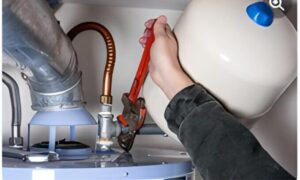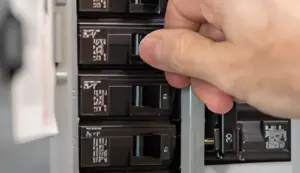In the race to achieve a comfortable living environment, the importance of a well-maintained air conditioning (AC) system cannot be overstated. However, amidst our daily routines, there is a silent danger lurking in our homes – an AC refrigerant leak.
This seemingly innocuous issue may initially go unnoticed, but its consequences can be both detrimental to your AC system and potentially harmful to your health. In this article, we will explore the signs of an AC refrigerant leak, the risks of overlooking it, and the necessary steps to address the issue.
Additionally, we will delve into the implications of phasing out certain refrigerants and how it affects older AC systems. By understanding these crucial aspects, you will not only save on costly repairs, but also ensure the safety and comfort of your home.
So, let's unravel the mystery of the silent danger that lies within our AC systems.
Signs of AC Refrigerant Leak
An AC refrigerant leak can be identified through several telltale signs indicating a loss of cooling power and reduced airflow from the vents. One common sign is a noticeable decrease in cooling power, resulting in longer cooling times.
Another indication is registers not blowing cool air, which is caused by insufficient refrigerant leading to less cold air from the vents. Hissing sounds from the indoor unit may also be heard, suggesting holes or cracks in the coils causing refrigerant leaks.
Additionally, frozen coils can be a sign of inadequate refrigerant, as condensation on the coils freezes. Lastly, elevated electric bills may occur due to poor cooling, resulting in increased system runtime and higher electricity usage.
It is important to address these signs promptly to prevent potential major repairs and breakdowns.
Risks of Refilling Refrigerant
Refilling refrigerant as a solution for AC refrigerant leaks poses significant risks and is not a recommended course of action. Here are three reasons why refilling refrigerant is not the answer:
- Temporary fix: Adding refrigerant is not a proper solution as it will eventually leak out again and require refilling. This means that the underlying issue causing the leak remains unresolved.
- Potential for further damage: Sealants, often used as temporary fixes, can cause blockages and further damage to the AC system. This can lead to more extensive repairs or even the need for system replacement.
- Cost implications: Refilling refrigerant can be costly, especially as the price of refrigerant is increasing. Additionally, ignoring the leak and relying on refilling can result in long-term consequences, including system breakdowns.
Instead of refilling refrigerant, it is recommended to call a reputable HVAC service company to detect and repair the leak. In some cases, the replacement of the refrigerant coil or even the entire system may be necessary.
Proper Way to Address a Refrigerant Leak
Addressing a refrigerant leak in your AC system requires prompt action and the expertise of a reputable HVAC service company. It is important to avoid jumping to conclusions and assume lack of cool air always indicates a refrigerant leak.
Calling a professional HVAC service company is crucial as they can quickly and accurately detect leaks. For small leaks, repair is recommended. However, serious or numerous leaks may necessitate the replacement of the refrigerant coil. In some cases, a system replacement may be the best option.
It is also important to consider the phase-out of harmful refrigerants, such as R22, which can no longer be imported or manufactured in the US. Carefully evaluating repair costs and following repair or replace guidelines can help make informed decisions.
Considering Refrigerant Phase-Out
Considering the phase-out of harmful refrigerants, such as R22, it is important to evaluate the impact on older AC systems and carefully weigh the cost of repairs against the long-term benefits. It is crucial to understand the implications of this phase-out and make informed decisions regarding maintenance and replacements.
Here are three key points to consider:
- Availability of refrigerant: With the phase-out of R22, the supply of this refrigerant is becoming limited and expensive. This means that if your older AC system relies on R22, the cost of refilling or repairing with this refrigerant will continue to rise.
- Energy efficiency: Older AC systems using R22 refrigerant are generally less energy-efficient compared to newer systems that use environmentally friendly alternatives. Investing in a new system not only reduces the reliance on harmful refrigerants but also lowers energy consumption and saves on utility bills in the long run.
- System longevity: Older AC systems that still rely on R22 refrigerant may encounter difficulties in finding replacement parts or qualified technicians for repairs. This can lead to extended downtime and higher repair costs. Upgrading to a new system ensures better reliability, easier maintenance, and access to readily available parts and services.
Evaluating Repair Costs and Older Systems
With the implications of the refrigerant phase-out in mind, it is essential to assess the costs of repairing older AC systems and their long-term viability.
Older systems cooled with R22, which is being phased out by the EPA, may not be worth expensive repairs. It is important to carefully consider the investment in repairs for these systems. Guidelines can help in deciding whether to repair or replace.
Repairing small leaks is recommended, but serious or numerous leaks may require coil replacement. In some cases, system replacement may be the best option.
It is crucial to evaluate the cost-effectiveness of repairing older AC systems and weigh the potential benefits against the long-term consequences of continued use.
Additional Resources for AC Troubleshooting and Information
For those seeking additional information and resources on troubleshooting AC systems and understanding more about refrigerant leaks, there are various helpful references available:
- AC Troubleshooting: Refrigerant Leak: This resource provides detailed information on how to troubleshoot AC systems for refrigerant leaks. It covers common signs of leaks, repair options, and the importance of addressing leaks promptly.
- Your R22 Air Conditioner: Repair or Replace Guidelines: This guide offers guidelines for deciding whether to repair or replace R22 systems. It discusses the impact of the R22 phase-out, evaluates repair costs, and provides insights into making informed decisions about older systems.
- Commercial Air Conditioning: This resource focuses on AC systems for commercial spaces. It provides information on system maintenance, troubleshooting, and best practices for preventing and addressing refrigerant leaks in commercial environments.
These resources can help homeowners, HVAC professionals, and commercial building managers gain a better understanding of AC troubleshooting and the importance of addressing refrigerant leaks promptly.
Frequently Asked Questions
How Can I Determine if the LACk of Cool Air in My Home Is Due to an AC Refrigerant Leak?
Determining if the lack of cool air in your home is due to an AC refrigerant leak can be done by observing signs such as longer cooling times, lack of cold air from vents, hissing sounds, frozen coils, and increased electric bills.
Are There Any Temporary Solutions I Can Use to Fix a Refrigerant Leak Before Calling a Professional?
Temporary solutions for fixing a refrigerant leak should be avoided as they can cause further damage. It is recommended to call a professional HVAC service company to accurately detect and repair the leak.
What Are the Potential Consequences of Ignoring an AC Refrigerant Leak?
Ignoring an AC refrigerant leak can lead to decreased cooling power, higher electricity bills, and potential system breakdowns. It may require expensive repairs or replacements, and the increasing cost of refrigerant adds to long-term costs.
How Do I Know if My AC System Uses R22 Refrigerant and What Are the Implications of the Phase-Out?
To determine if your AC system uses R22 refrigerant, consult the manufacturer's documentation or contact a reputable HVAC service company. The implications of the phase-out include limited availability of R22 and potentially higher repair or replacement costs for older systems.
Are There Any Guidelines Available to Help Me Decide Whether to Repair or ReplACe My AC System That Uses R22 Refrigerant?
Guidelines are available to help determine whether to repair or replace an AC system that uses R22 refrigerant. Factors to consider include the age of the system, repair costs, and the availability of R22 due to its phase-out.
Conclusion
In conclusion, an AC refrigerant leak is a serious issue that can have detrimental effects on both your AC system and your health. It is important to be aware of the signs of a leak and to address it promptly to prevent further damage and costly repairs.
Additionally, with the phasing out of certain refrigerants, it is crucial to evaluate the implications on older AC systems. By taking the appropriate steps to address a refrigerant leak, you can ensure a safe and comfortable environment in your home.








